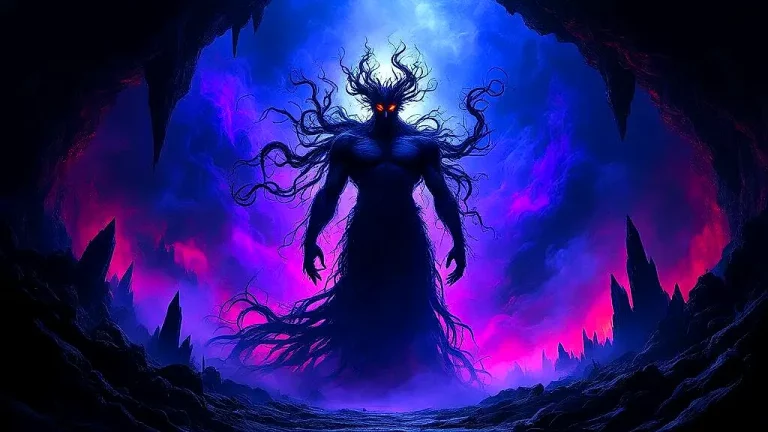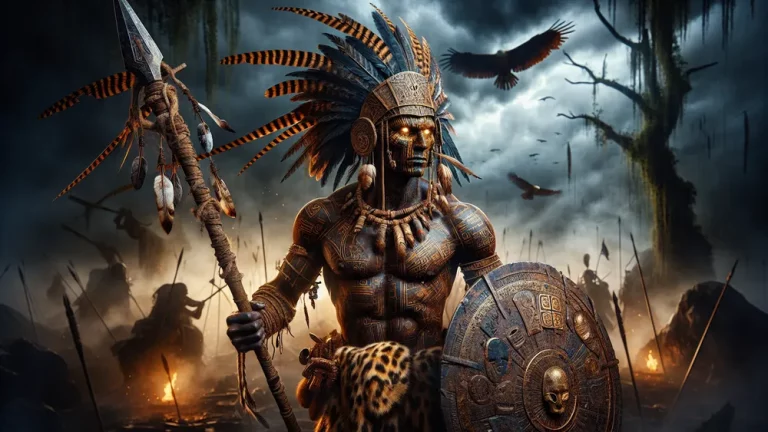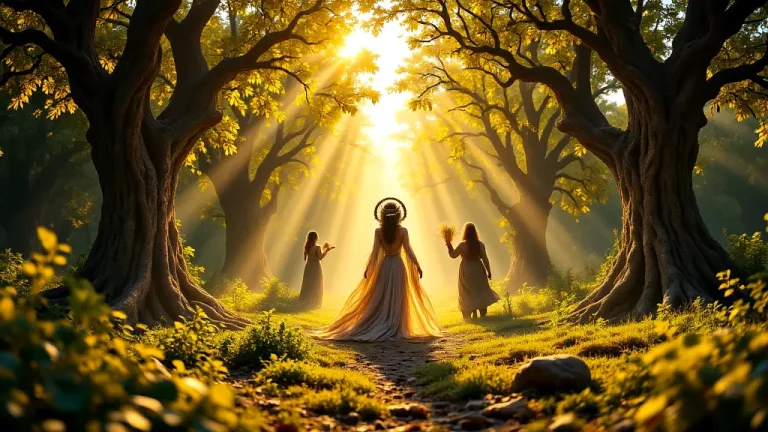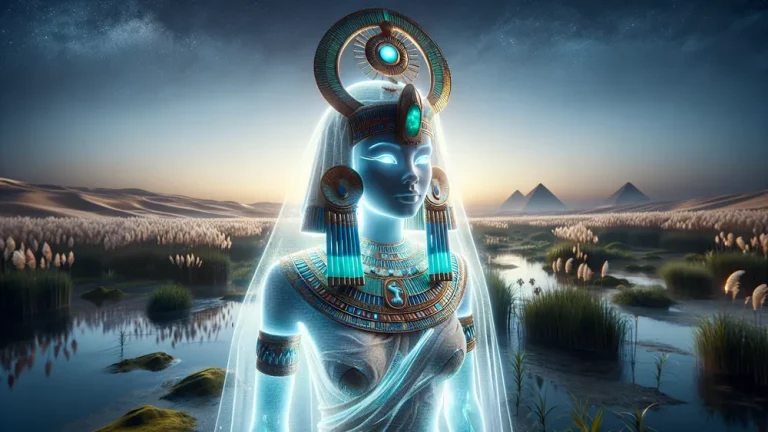Nomos: The Daemon Of Laws In Greek Mythology And Beliefs
In Greek mythology, there is a daemon named Nomos, different from gods and normal spirits, which found a spot that interests because of their big roles in parts of human life and how everything works. One daemon like this, Nomos, is the idea of law and order, which means the old Greeks had a deep respect for well-built rules and legal ideas.
Key Points:
- Nomos is a spirit in Greek myth who represents law and order.
- He connects with gods like Zeus and Themis, ensuring a mix of divine and human rules.
- The Greeks thought of Nomos not as a visible god but as an unseen force that affects life.
- Nomos was important in making rules for Greek city-states, ensuring fairness and order.
- Nomos and Themis worked together to ensure cosmic and earthly justice.
- Nomos’s ideas were deeply mixed into Greek culture, law, and daily life.
- Tales involving Nomos teach about the value of laws and the harmony they bring.
This part helps you get familiar with the idea of Nomos in the world of Greek myths as a not-too-known but important spirit. Like today’s law systems which keep people in line, Nomos stood for rules that kept calm between gods and humans both.
This part works like a doorway to finding out more about the stories and importance surrounding Nomos, urging you to study further into their roles and stories which made their place strong in both the myth world and the society structure of old Greece.
Nomos: Overview and Key Facts
| Key Aspect | Description |
|---|---|
| Name | Nomos |
| Type | Spirit or daemon |
| Area | Law, order, and ways of ruling |
| Means | Stands for structured ruling and legal rules similar to today’s ideas of law |
| Role | Known because it means important rules of law and order which affect both divine and human worlds |
| Links with Gods | Zeus and others like him are sometimes tied to Nomos, because Zeus symbolized big power and Themis, showing divine law, and their roles help keep things calm |
| Cultural Impact | Nomos was not just a mythical part but also helped form the basic rules for how people acted and what legal systems used in ancient Greece |
| Shown in History | In old writings and stones, and seen in some art, but not as much as other gods of Olympus |
| Different Views | Seen differently in varied stories and situations, with some focusing on more vague ideas, whereas others call Nomos a clear figure in the stories of myths |
Where Did Nomos Come From in Greek Stories?
To get the importance of Nomos in Greek mythology, you have to look at how it started and was seen in different older stories. Understanding this, you find where it began and how it was, seeing why it seemed important.
Thinking About Nomos as a Spirit
Greek mythology makes us think of Nomos as a daemon holding law and order principles, an important piece that keeps the community’s peace. Unlike Olympian gods, who meant more real parts of life like love or war, Nomos was abstract, like the laws we live by now.
The ancient Greeks didn’t see Nomos as a god you could look at but as an unseen force reaching all parts of life, both human and divine, making sure peace and fairness happened. This unseen force in stories means that Greeks highly valued ordered ways of governing and ethical acts, relying on this kind of spirit to keep order, not only with gods but also with people.
As a daemon, Nomos stayed with other spirits meant to keep the cosmic balance, which means the ancient Greeks saw law not just as rules made by people but as something bigger, part of a universal order.

In Greek mythology, Nomos was an invisible spirit that kept law and order, showing the ancient Greeks’ deep belief in a cosmic order beyond just human-made laws.
How People Saw Nomos in History
People in the past saw Nomos, a spirit, in Greek literature and art. Nomos, often in texts, stands for law and good order, which are important to understanding Greek civilization. Important names like Solon and Plato, they sometimes talked about it in their ideas on justice because this spirit’s ideas meant something to them. Direct talks about Nomos, however? Not as common as those of gods.
In the art world, not often was Nomos drawn like gods, but it appeared in themes of order and fairness, you could see it in balance scales or tablets, like images we see for laws today. Moreover, there are writings in stone that gave experts new ideas about the respect for Nomos, especially in city and law places.
Such stone writings might be used in important buildings, where people needed to feel law around them. For example, some city-states had stone law writings, including mention of Nomos, serving like today’s laws that people can read. These facts about Nomos highlight how mixed up his ideas were with the running of cities, meaning values that were both spirit-like and key for running things smoothly.
Nomos and Ancient Greek Life
In old Greek places, the idea of Nomos was not just a big thought but a necessary part of daily living that decided how people talked to each other and those who were in charge. Nomos, which had law and order, was central in making city-state customs and rules, like how our laws now guide our lives.
You could see Nomos in Greek towns in the writing of rules, maybe best in Athens with people like Solon, who put in ideas about fairness and order that many saw as what Nomos was all about. These ideas made social actions and court work very organized, a mix of god’s will and human thinking.
This is much like how laws today tell us what we must do and what rights we have, creating a sense of peace and reliability. Some towns, however, had Nomos in ways that reflected their own community values and needs, bringing about varied legal rules across Greece. For example, Sparta’s strict and army-focused life had different laws from Athens’ ideas about group choice.
This difference in how things were done means Nomos was important but could change, fitting into local ways while keeping the main idea of having order. Such differences are similar to our systems today where different places make rules that work for them, but still under the bigger country’s laws.
As a daemon of law, Nomos was a connecting idea that worked practically in many parts of Greek living, guiding politics and personal interactions, helping keep communities strong and steady.

Stories with Nomos
When you look at the role of Nomos in myth stories, you see interesting tales, which mean Nomos has an important effect on gods and people too.
The Story of Nomos and Themis
There is a story about Nomos and Themis, set in Greek myth, where balance of cosmic order and laws people follow appears to be arranged by gods. Themis, a Titaness is an example of god-made rules, nicely fits with Nomos, who stands for human law and how society is set up.
They together mean a good mix between universe justice and rules on earth, much like thinking they are two parts of one thing – Themis handles nature rules from the universe, and Nomos sees people follow their laws too. It’s not a higher or lower thing but working together, this means the belief that god and human rules are of one piece.
In myth, Themis often is seen helping Zeus, the top god, which means she is a big part of deciding by gods. Here, Nomos is imagined as helping too, making god rules felt in human life. While gods on Olympus make big rules, Nomos makes these have a place among humans, leading to order respected by old ones.
This way of Themis giving the plan for balance and Nomos making it work not just in words but in life plainly seen. The mix of Nomos and Themis appears to start myths about how laws were seen in Greece – not alone, not without reason, but part of a bigger order.
Few stories still talk directly of Nomos and Themis together, but their idea means a thought deep in Greek mind. For Greeks, they both kept in mind how god and earth are linked, making sure human laws matched an eternal, cosmic justice thought by gods themselves.

Nomos and Zeus’s Tale
In Greek myth, the connection of Nomos and Zeus is shown through the idea of rule and god power. Zeus at the top of Olympus, had the job of keeping order among gods and people. Nomos, standing for law and order among humans, helps without being loud but is important in guiding Zeus’s choices.
Think of Zeus like a king who needs balance between too much god power and having rules, where Nomos is there quietly to make sure every big decision keeps things fair and orderly. This team-up means they want the same thing, making everything fit in a fair way based on solid rules.
When Zeus makes a choice, it affects people’s lives, and Nomos turns this into human law that looks like divine justice. One time, for example, is when Zeus’s ideas about people’s future, sometimes harsh, sometimes kind, would need Nomos to make sure these choices matched cosmic justice and what people expect from rules.
Myths tell how Zeus’s plans get done through laws that have the feel of Nomos, meaning the rules set by gods and human laws lined up right. Imagine a ruler using all rules to mean big moral ideas, this is how Zeus’s choice-making and Nomos’s quiet role fit in.

Even without stories about Nomos and Zeus fighting or loving, you see Nomos in things like justice and societal stability in Zeus’s rule. These tales mean we see how laws between gods and men were wise and fair, core things Nomos stands for.
When looking at Zeus and Nomos, you find Greeks tell these to show they respect both god power and law order, pointing to the myth thought: justice and order come from ideas made by gods and men’s rules together.
What Nomos Stands For and How People Understand It
After we looked at how Nomos and gods are connected, we need to see what Nomos stands for as a sign of justice and order. Now, let’s look into how the people of ancient Greece understood it.
Nomos as a Sign of Fairness and Order
In old Greek stories and thoughts, Nomos was really valued for being about law, order, and fairness; it was a basic part of society’s rules. Nomos is seen as how both space and human groups are organized, not just an idea but a strong guide believed to go through all parts of Greek life.
You can think of Nomos like today’s idea of community standards or a guide for right actions, making sure groups work well together. Discussed by thinkers like Plato and Aristotle are these ideas, linked to what makes justice and virtue that hold a well-ran state. They saw Nomos as god-made or nature laws that real people laws should match, to keep society from falling into a mess.
The meaning of Nomos went further than only legal rules, showing an ideal where each person’s actions should add to the good of everyone and fairness in the community. This idea is like the unwritten rules today that aim for fairness and community good.
In seeing Nomos, old art and writing often show it as a force that fixes fights, lines up human rules with higher order, and keeps balance in groups. For Greeks, living with Nomos was not just about following codes but filling actions with fairness and justice ideas to keep group harmony.
This view helped build a culture where personal duties and group roles followed the big ideas of Nomos, teaching on ethical governance past its time.

In old Greek culture, Nomos meant much more than following laws; it was about fairness and harmony in society, guiding personal actions for the community’s good, much like today’s unwritten rules.
How Nomos Fit Into Greek Traditions
In the mix of old Greek ways, Nomos was not just a big idea but a part that goes deep into the culture and religion of the people. Both in the laws and everyday customs which highlighted how cities work, like how today’s rules affect both government ways and our living.

A way its power is seen is in Greek religious festivals, where activities remembered community rules and duties, Nomos appears as the force behind these events. Just like how yearly events now might mean the main values of our society, Greek actions like the Panathenaea in Athens both honored traditions and reflected group law ideas linked with Nomos.
These practices stressed the need for living with rules, underlining that following Nomos mattered not only for personal goodness but also for societal well-being. Such joining of Nomos showed Greeks thought of law as holy, following it mirrored a god-given order, which means its lasting mark in culture and town life.
All the Greek Spirits and Daimones
Greek mythology has a group of spirits and daimones that cover different parts of life and nature, like love and fear, or even things like winds and seas. These were like go-betweens that did things between gods and people, like small gods that affected the mortal realm in complicated ways.
For people interested in finding out more about these interesting spirits, a full Greek Spirits and Daimones list gives a big look-over, explaining the many roles and stories tied to each daimon in Greek myths.
FAQs
1. What is the primary role of Nomos in Greek mythology?
The primary role of Nomos in Greek mythology is to embody the concept of law, order, and structured governance within both the divine and mortal realms.
2. How does Nomos relate to other Greek daemons or gods?
Nomos relates to other Greek daemons or gods through his embodiment of the principles of law and order, often working alongside deities like Themis to ensure harmony and fairness in both divine and mortal realms.
3. Are there modern interpretations of Nomos in today’s culture?
Modern interpretations of Nomos in today’s culture can be seen in the continuing emphasis on issues of justice, legal systems, and societal governance reflecting ancient concepts.
4. What lessons can be derived from the myths involving Nomos?
The lessons that can be derived from the myths involving Nomos emphasize the importance of adherence to laws and the balance of order as foundational elements of a harmonious society.







